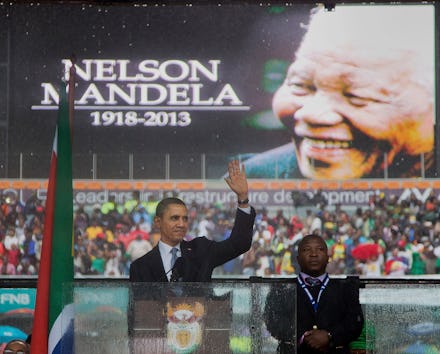Why We’re Wrong About the Fake Mandela Interpreter

News of the "fake" interpreter at Mandela's memorial, Thamsanqua Jantjie, has managed to make headlines across the globe, and much of the coverage has focused on ridiculing him.
The coverage has been endless. It has ranged from a tasteless gaffe on the TODAY show to a hilarious segment where Jimmy Kimmel asks a real interpeter to make sense of Jantjie's signing:
But remarkably absent from the discussion is the perspectives of the deaf community. Even though many articles reference the community's outrage, few have attempted to dig deeper into their reactions.
Cara Loening, director of the Sign Language Education and Development in Cape Town, told the South African Press Association that Jantjie "made a mockery of the service. How disrespectful for what Madiba (Mandela's clan name) stood for.”
South Africa's government is now investigating the incident. However, they are likely doing so out of embarrassment rather than out of concern for the deaf community. After all, deaf South Africans have previously complained about Jantjie's signing, but nothing was done about it. This indicates that people are only paying attention because of where this incident took place instead of thinking more about those it ridiculed and excluded.
What we're missing is an opportunity to talk and think about the exclusion of the deaf community: not just in South Africa, but here in the U.S. too.
In fact, during the aftermath of Hurricane Sandy, Mayor Bloomberg's interpeter gained prominence during a press conference, after Twitter users took notice of her signing. Videos of Lydia Callis went "viral" for her expressive interpreting.
Unlike the coverage of Jantjie, the GIFs and jokes online were made mostly out of admiration for Callis. Saturday Night Live even spoofed the incident (also using fake sign language).
Huffington Post went for a different approach: setting different clips of Callis signing to music.
Hilarious, right? RIGHT?
Our collective gawking, even if adoring, is still problematic. This isn't about appreciating sign language or deaf culture. It's about pointing and gawking at something without attempting to understand it. And this has been the case in both of these incidents.
Speaking to CNN on Wednesday, deaf actress Marlee Matlin said that everybody needs to "understand and appreciate that sign language is a legitimate language." In the interview with Jake Tapper, she shows that interpretation really is no laughing matter:
Interpreters need and are important parts of our lives. We need to put them in every part of our lives to interpret. Interpreters have a tough job and they are trained and they need to be certified they need to be able to work in environments such courts, such as in educational settings and that is why this situation is highlighting this.
Being more inclusive of people with disabilities is crucial, but not because of the possibility of high-profile embarrassment. It's because we should be thinking about how to communicate with people from all walks of life. And doing that starts with actually incorporating the voices of deaf people in, you know, conversations about them.